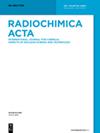Influence of gamma irradiation on germination traits, growth and biochemical attributes of dragon fruit (Selenicereus monacanthus)
IF 1.7
3区 化学
Q4 CHEMISTRY, INORGANIC & NUCLEAR
引用次数: 0
Abstract
The aim of this research is to assess the effectiveness of gamma irradiation in developing genetic variability in dragon fruit by influencing biochemical attributes. Seeds of dragon fruit were exposed to 100, 200, 300, 400 and 500 Gy γ-radiation using Co-60 source. Highest germinability, mean germination time, mean daily germination, vigour index and growth rate were observed in untreated seeds, however these traits were relatively less affected at lower irradiation level (up to 200 Gy). An irradiation level of ≥ 400 Gy severely affected germination traits and seedling growth and consequently 441 Gy irradiation level was considered as the lethal dose (LD伽马辐照对火龙果(Selenicereus monacanthus)发芽特性、生长和生化属性的影响
本研究旨在评估伽马辐照对火龙果生化属性的影响,从而评估伽马辐照对火龙果遗传变异的有效性。使用 Co-60 源对火龙果种子进行 100、200、300、400 和 500 Gy γ 辐射。未处理的火龙果种子发芽率、平均发芽时间、平均日发芽率、活力指数和生长率最高,但在较低的辐照水平(最高 200 Gy)下,这些性状受到的影响相对较小。辐照水平≥ 400 Gy 会严重影响发芽性状和幼苗生长,因此 441 Gy 的辐照水平被认为是火龙果的致死剂量(LD50)。未经处理的火龙果幼苗的光合色素、蛋白质含量和营养成分含量最高,200 Gy 以下的含量中等。研究结果表明,脯氨酸、酚、类黄酮和抗氧化酶(超氧化物歧化酶、过氧化氢酶和抗坏血酸过氧化物酶)等非生物胁迫耐受性生化指标的浓度在 200 Gy 的辐照水平下明显偏高。因此,200 Gy 的辐照剂量可被视为诱变火龙果耐受非生物胁迫的最佳剂量,对幼苗生长性状的意外损害可能最小。这些发现为有效利用γ-辐照加快火龙果耐受非生物胁迫突变品系的培育提供了宝贵的见解。
本文章由计算机程序翻译,如有差异,请以英文原文为准。
求助全文
约1分钟内获得全文
求助全文
来源期刊

Radiochimica Acta
化学-核科学技术
CiteScore
2.90
自引率
16.70%
发文量
78
审稿时长
6 months
期刊介绍:
Radiochimica Acta publishes manuscripts encompassing chemical aspects of nuclear science and technology.
 求助内容:
求助内容: 应助结果提醒方式:
应助结果提醒方式:


